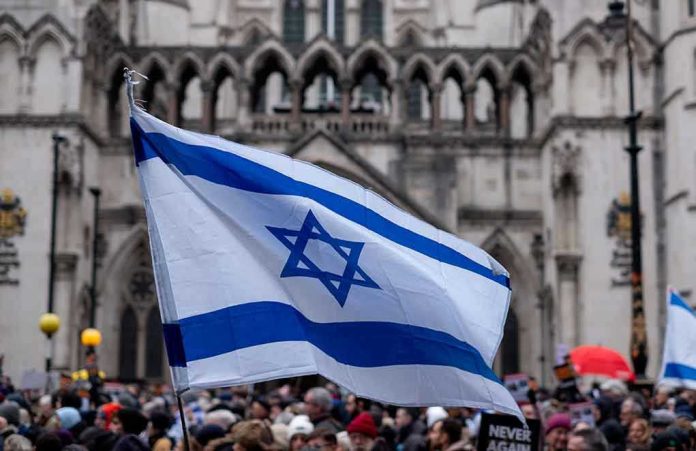
When centuries of rivalry, social tension, and unchecked passion collide, a football match can become a battleground that shakes the very foundation of a city—and the Tel Aviv derby’s abrupt abandonment is a wake-up call that Israeli football’s fiercest feud has reached a breaking point.
Story Snapshot
- Tel Aviv’s iconic derby between Maccabi and Hapoel was abandoned mid-game after fan violence spiraled out of control.
- Fireworks and smoke bombs launched onto the pitch triggered riots, exposing severe flaws in stadium security and crowd control.
- The incident spotlights deep social divides and the escalating influence of ultra fan groups in Israeli football culture.
- Authorities and clubs now face tough questions about sanctions, future match safety, and the reputation of Israeli sport.
Violence Overtakes Israel’s Most Storied Football Rivalry
Tel Aviv’s football scene descended into chaos as the derby between Maccabi Tel Aviv and Hapoel Tel Aviv was abandoned. The game, anticipated for its intensity and historic rivalry, ended not with a final whistle but with a surge of violence from the stands. Fans hurled fireworks and smoke bombs onto the pitch. The spectacle rapidly escalated into a riot, forcing officials to halt play and evacuate players, staff, and thousands of spectators under the shadow of security failures. The incident stood apart even in the history of heated derbies, marking one of the most severe public disorders in Israeli sports.
The match’s abandonment reverberated across Israel, drawing swift condemnation from league authorities, club officials, and security experts. Videos circulating online captured both the pyrotechnics and the panic, amplifying public outrage and launching urgent debates about the adequacy of existing crowd control measures. For Tel Aviv, a city known for its vibrant football culture, the violence represented not just a sporting failure but a rupture in communal trust and safety, echoing deeper fault lines running through Israeli society.
Rivalry, Social Division, and the Power of Ultras
The Tel Aviv derby is far more than a fixture on the Israeli Premier League calendar; it is a microcosm of Israel’s social and political divisions. Maccabi and Hapoel represent not just clubs but distinct identities and ideologies, their rivalry stretching back to the early twentieth century. Over the years, this contest has become a theater for passionate expression, sometimes tipping into provocation and confrontation. In recent seasons, the rise of ultra fan groups—organized, fiercely loyal, and increasingly provocative—has driven tensions higher, often overwhelming the capabilities of club management and local law enforcement.
Social media has acted as an accelerant, allowing fan groups to mobilize rapidly and coordinate actions that challenge traditional security protocols. The derby’s abandonment is the culmination of years of escalating provocations: previous matches saw pitch invasions, arrests, and sporadic violence, but rarely has disorder forced a full suspension mid-game. The clubs themselves walk a tightrope, seeking the energy and engagement of their supporter bases while risking reputational damage and punitive measures from league authorities when violence erupts.
Maccabi Tel Aviv & Hapoel Tel Aviv share the same stadium.
This was Hapoel home game. Details around the postponement over unrest still emerging.
Footage released by police focuses on Hapoel fans in red https://t.co/JC1WnMI9Mv pic.twitter.com/gE9Hz3tvMz
— Rob Harris (@RobHarris) October 19, 2025
Aftermath: Investigations, Sanctions, and Uncertainty
As of October 20, 2025, the fallout from the abandoned match continues. League officials have launched investigations, while police review video evidence and interrogate suspects arrested at the stadium. Both Maccabi and Hapoel face possible sanctions, including hefty fines, point deductions, and—most damaging—a ban from hosting future matches in their home stadiums. The disciplinary process is underway, with hearings expected to determine the fate of both clubs and set precedents for future league conduct.
Statements from club executives and league spokespeople universally condemn the violence and promise cooperation with authorities. Security experts advocate for technological upgrades—better surveillance, stricter entry screening, and closer coordination with fan groups. Yet, the challenge remains acute: how to balance the passion and identity that make the derby special with the imperative of safety and order. The economic and social impacts ripple outward, affecting local businesses, international perceptions of Israeli football, and the everyday fans who now face tighter restrictions and uncertainty about future matches.
Deeper Implications: Social, Economic, and Political Fallout
The derby’s abandonment is more than a headline—it is a lens on Israel’s struggle to reconcile tribal loyalties with civic responsibility. Players and staff were exposed to danger, families and non-violent fans must now navigate heightened security, and the city’s reputation as a football hub faces scrutiny. Financial losses from ticket refunds and potential stadium closures threaten club finances, while the political debate over policing, public safety, and the role of sport in Israeli society intensifies.
Sociologists and legal experts frame the derby as emblematic of Israel’s broader social divides. Some argue that harsh collective punishments, like stadium bans, risk alienating the majority of responsible fans. Others insist that only decisive deterrence can prevent future disasters. The incident will likely drive league-wide reforms—tighter crowd management, new stadium protocols, and perhaps a rethink of how rivalries are channeled in a divided society. For Tel Aviv and Israeli football, the question now is whether this crisis will prompt genuine change or simply become another chapter in a long, tumultuous rivalry.
Sources:
Israeli soccer game abandoned after rioting rival fans throw flares and smoke grenades
Tel Aviv soccer derby cancelled by police due to ‘violent riots’
Israeli soccer game abandoned after rioting
Tel Aviv derby called off due to ‘public disorder and violent …













